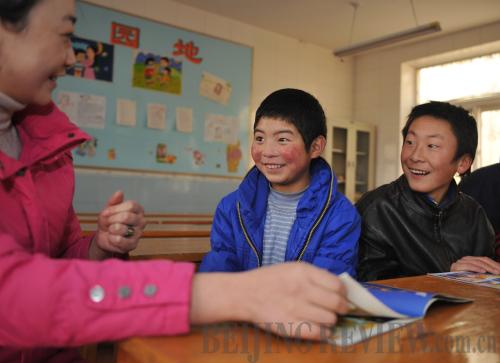|
Relief efforts
 |
|
BEING CARED FOR: A teacher instructs minor residents in a relief station for vagrants and beggers in Lanzhou, Gansu Province, on January 4, 2010 (NIE JIANJIANG) |
A national relief system aimed at helping vagrants, both adults and children, was set up in August 2003 as the Measures for Assisting Vagrants and Beggars With No Means of Support in Cities promulgated by the State Council went into force.
Under the system, eligible vagrants can apply and receive free board and lodging at relief stations and get treated for medical emergencies. Adults can stay for up to 10 days and can voluntarily leave at any time, whereas minor residents should get permission from the relief stations before leaving.
A relief station will inform its minor residents' family members to pick them up. For minor residents whose family members refuse to receive them, the local civil affairs department overseeing the relief station shall inform its counterparts in the minor residents' hometowns to bring them back and send them to their family members.
Minor residents whose family members cannot be found shall be placed under care by the civil affairs departments of their hometowns, and those whose hometowns also cannot be identified shall be attended by the governments of the localities where they are found.
In 2006, the government started to build protection centers for street children. So far more than 1,400 relief stations and 310 plus street children protection centers had been set up. In the next five years, more such centers will be built, said Dou.
The centers are designed to get vagrant children off the streets, and the children are welcome to stay there until they are reunited with their parents, said Gao Yueling, head of the Social Affairs Bureau of the Ministry of Civil Affairs.
At the centers, residents will also receive free general education and vocational training to prepare them for adult life, Gao said.
Xinjiang used to help about 3,000 street children every year, most of whom were brought back from other parts of the country, said Sun Haiyu, an official with Xinjiang's Civil Affairs Department.
Reintegration
But researchers with the Institute of Sociology of the Xinjiang Academy of Social Sciences estimated as many as 60-70 percent of the street children brought back to Xinjiang in previous years soon returned to the streets in other provinces.
Stealing and robbing in places outside of Xinjiang has become part of the lifestyle for some street children; after they were sent home, they could no longer get used to a poor, but normal life in their hometowns, said Li Xiaoxia, a researcher with the Xinjiang Academy of Social Sciences.
Putting street children under alternative care involves transferring of legal custody over children. Chinese laws such as the General Principles of Civil Law and the Law on Protection of Minors stipulate the court can revoke the custody of any parent and other guardians for abusing or neglecting a child.
Yet so far, court rulings revoking the custody of a child's guardian are very rare, Tong Lihua, Director of the Minor Protection Law Committee of the All China Lawyer's Association, recently told Beijing Evening News.
"It is because ambiguities about who is eligible to apply for the termination of the custody over a child and who should raise the child after the custody is revoked," Tong said.
Dou said the problem of street children should be tackled at their roots. The measures Dou mentioned include strengthening social security and social relief systems to ensure children's basic living standards and beefing up efforts in cracking down on human trafficking and other related crimes should be beefed up.
For parents failing to fulfill their roles, their custody should be terminated if necessary to protect children's rights, Dou said.
Shelters have been built for street children to be put in alternative care. In the past five years, the Central Government has built 15 shelters, which can accommodate more than 1,500 vagrant children in total, in Kashi, Hotan and Aksu, said Sun.
Xinjiang's new initiative focuses on building more shelters and providing vocational education to prevent vagabond children from returning to the streets.
This year, Xinjiang plans to spend 50 million yuan ($7.70 million) on a training center for vagrant children. Minors who are mentally healthy and willing to learn can receive free education and training, said Xinhua News Agency. | 